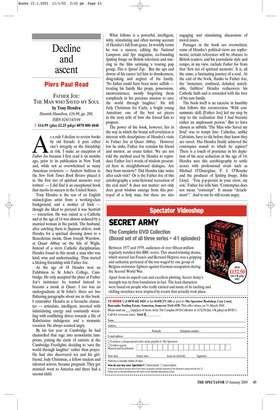Decline and ascent
Piers Paul Read
FATHER JOE: THE MAN WHO SAVED MY SOUL by Tony Hendra Hamish Hamilton, £16.99, pp. 288, ISBN 0241143144 V £14.99 (plus £2.25 p&p) 0870 800 4848 As a rule I decline to review books by old friends: it puts either one’s integrity or the friendship at risk. I make an exception of Father Joe because I first read it six months ago, prior to its publication in New York and, while not as overwhelmed as many American reviewers — Andrew Sullivan in the New York Times Book Review placed it in ‘the first tier of spiritual memoirs ever written’ — I did find it an exceptional book that merits its success in the United States.
Tony Hendra is the son of an English stained-glass artist from a working-class background, and a mother of Irish though she liked to pretend it was Scottish — extraction. He was raised as a Catholic and at the age of 14 was almost seduced by a married woman in the parish. The husband, after catching them in flagrante delicto, took Hendra for a spiritual dressing down to a Benedictine monk, Dom Joseph Warrilow, at Quarr Abbey on the Isle of Wight. Instead of a stern Catholic disciplinarian, Hendra found in this monk a man who was kind, wise and understanding. Thus started a lifelong friendship with Father Joe.
At the age of 18 Hendra won an Exhibition to St John’s College, Cambridge. He only accepted the place at Father Joe’s insistence: he wanted instead to become a monk at Quarr. I too was an undergraduate at St John’s: there are two flattering paragraphs about me in this book. I remember Hendra as a farouche character — articulate, intelligent, invested with intimidating energy and constantly wrestling with conflicting drives towards a life of Rabelaisian indulgence and a monastic vocation. He always seemed angry.
By his last year at Cambridge he had channelled that rage into iconoclastic lampoons, joining the circle of satirists at the Cambridge Footlights, deciding to ‘save the world through laughter’ rather than prayer. He had also discovered sex and his girlfriend, Judy Christmas, a fellow student and talented actress, became pregnant. They got married, went to America and there had a second child. What follows is a powerful, intelligent, witty, stimulating and often moving account of Hendra’s fall from grace. In worldly terms he was a success, editing the National Lampoon and Spy magazine, co-founding Spitting Image on British television and starring in the film satirising a touring pop group, This is Spinal Tap. But the ups and downs of his career led him to drunkenness, drug-taking and neglect of his family. ‘No father could have been more selfish treating his family like props, possessions, inconveniences, mostly forgetting them completely in his precious mission to save the world through laughter.’ He left Judy Christmas for Carla, a bright young American: one of the best set pieces in the story tells of how she forced him to propose.
The power of the book, however, lies in the way in which the brutal self-revelation is intercut with descriptions of Hendra’s visits to Father Joe at Quarr Abbey. However low he sinks, Father Joe remains his friend and mentor, an ersatz father. We are not told the method used by Hendra to reproduce Father Joe’s words of wisdom presented here in straightforward dialogue. Are they from memory? Did Hendra take notes after each visit? Or is the Father Joe of this autobiography a semi-fictional recreation of the real man? It does not matter: not only does great wisdom emerge from this portrayal of a holy man, but there are also engaging and stimulating discussions of moral issues.
Passages in the book are overwritten; some of Hendra’s political views are sophomoric; certain references will be obscure to British readers; and his journalistic style and tempo, in my view, exclude Father Joe from that ‘first tier of spiritual memoirs’. It is, all the same, a fascinating journey of a soul. At the end of the book, thanks to Father Joe, the ‘immature, confused, deluded, unreliable, faithless’ Hendra rediscovers his Catholic faith and is rewarded with the love of his new family.
The book itself is an exercise in humility that follows this reconversion. ‘With consummate skill, [Father Joe] led me step by step to the realisation that I had become rather an unpleasant person.’ But to have chosen as subtitle ‘The Man who Saved my Soul’ was to tempt fate: Catholics, unlike Calvinists, have to die before they know they are saved. Has Hendra finally achieved the contemptus mundi to which he aspires? There is a touch of prurience in his depiction of his near seduction at the age of 14; Hendra uses this autobiography to settle scores with professional rivals such as Michael O’Donoghue, P. J. O’Rourke and the producer of Spitting Image, John Lloyd. ‘You p-p-persist in your error, my son,’ Father Joe tells him. ‘Contemptus does not mean “contempt”. It means “detachment”.’ And to me he still seems angry.





















































 Previous page
Previous page